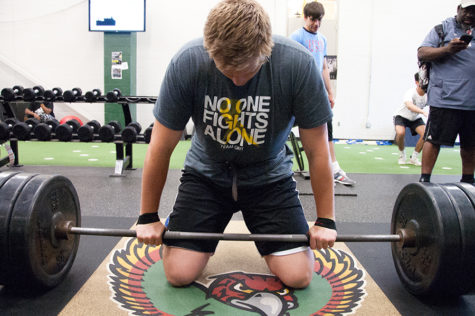Tired of the Culture: Part 1
Victims share their experiences with rape culture and sexual violence
Anonymous
“I was with someone for a long time, for like a year. We broke up in September and that was kind of hard on me. I just felt really stuck, so I turned to drinking on the weekends and parties and getting high.”
Fifty percent of sexual assault happens while victims or perpetrators are under the influence of alcohol or drugs, according to the National Institute of Alcohol Abuse. While intoxicated, victims’ lack of consciousness and good judgement make them easy targets of sexual violence.
“I remember consenting at first to have sex, but then I told him he needed to use a condom. I blacked out, and when I came back to he didn’t have one on and it was really hurting. I was telling him to stop and was grabbing him and trying to move him off me, but he told me to shut up and kept going…I remember wondering how much longer it was going to last because I was telling him ‘no’ and ‘stop’ and he wasn’t listening to me.
The next day I went to school…I was really close with this guy. While we were sitting in the classroom, I told him ‘this is what happened’ and ‘I don’t know really know what this means.’ He basically gave me an ultimatum that if I didn’t tell anyone he would tell someone. I started bursting out crying and I had to go to the assistant principal’s office.
She had me write down what happened while the nurse was telling me my options. I think it’s mandatory for them to report it, so she was going to have to tell my mom either way. She came and read what I wrote down and we went to the hospital.
I had to do a lot of blood tests to find out if I was pregnant or if I had contracted any STDs. I wasn’t allowed to pee or shower. I was in there for like eight hours because it’s was taking so long to get the results back. I was just sitting in my room with my parents and the officer when they finally took me upstairs to get a rape kit.”
After being sexually assaulted, victims’ chances of contracting an STD are higher. As many cases are not reported due to victims’ embarrassment or fear, potentially life-altering diseases such as HIV and Chlamydia are often left untreated, according to The New England Journal of Medicine.
“So it was one big room. There was a curtain and a hospital bed where she did the rape kit. They had to use a speculum to see if there was any bruising or tearing. I remember being in a lot of pain and crying and my mom just holding my hand. The worst part was getting all the shots and having to take all the pills like Plan B and STD preventatives.
I had to go to school the next day. I would hear rumors like people saying that I hit rock bottom for having sex with this guy. People would call me out to my face like ‘Why’d you have sex with him?’ People would make jokes about it and I would tell them it wasn’t funny. This one guy said, ‘It’s actually really hilarious.’ I remember freaking out and crying in the middle of class and having to leave. I called my mom and she said I would just have to get used to it.
He never had to give a statement in court, and he had constant intimidation over me. Six months after it happened, I was told the district attorney wasn’t going to take the case because it was more of a grey area of what he had done. Apparently I remembered too much of what happened for it to be non-consensual or legally a problem. I kind of knew it was coming, but I was still really heartbroken that he had money and intimidation and I was poor, so I wasn’t able to fight back and get justice.”
Out of every 1000 rapes, 994 perpetrators will walk free of conviction. Rapists are less likely to go to jail than any other type of criminal, according to the Rape, Abuse and Incest National Network.
“I constantly wanted to tell people what had happened to me and that he was an awful person…but I needed to move on and take care of myself more. So it changed me in that I had to stop caring what people thought about me. But it also changed the way I can focus in the classroom. I thought it was my depression, but I’ve been diagnosed with trauma induced ADD. I go to a lot of therapy, group and individual, and I go to the sexual trauma and care center…a lot of stuff like that to try and get help.
A sexual assault experience can require large amounts of time and money to recover from. As victims’ trauma can induce debilitating conditions such as ADD, years of therapy and thousands of dollars worth of medication are often required to regain their mental stability.
“There are so many times I’ve thought about killing myself, and I’ve hurt myself since it happened because I feel like I have no control over anything. I don’t think that needed to happen to me for me to wake up, but it helped make me stronger and more aware.”
Akayah Tate-Locke
“Sophomore and freshman year, I had a very bad experience with a student at Free State where stalking was a huge issue. It was hard to get away from that person because I was in the hallways with them all the time. I’m okay now because my assaulter isn’t here anymore. But freshman and sophomore year I lived in extreme paranoia all the time because I had to go to school with that person. I didn’t feel safe at all.”
A lesser known form of sexual harassment is stalking. Stalking is a pattern of repeated and unwanted attention, contact, or any other course of conduct directed at a specific person which could cause them to feel fear, according to the RAINN. Stalking causes victims to develop intense paranoia and anxiety, making it extremely difficult to go about their everyday life as they are in constant fear of their assaulter.
“I know that, if I had come to the school and talked about my issues, it could have been taken care of so that it wouldn’t have gotten to be as extreme as it was. But just from what I’ve seen with other girls, I have never felt like [the administration] would take me seriously, especially since I didn’t have any proof of that person doing it to me. I never reported it for the longest time. It went on for a whole year of that person stalking and harassing and assaulting me.
I’ve seen all kinds of sexual harassment like catcalling, groping and inappropriate touching. I’ve reported numerous times to the office about sexual harassment and even assault in some cases, and the school has never done anything. I’ve never seen any change happen.”
Rape culture accepts forms of assault such as groping and catcalling as insignificant, inevitable behaviors. Despite the anxiety and discomfort this harassment can cause, victims rarely report these occurrences as they assume their perpetrator’s actions will go unpunished.
“I feel like they just blow it off, it’s definitely not their biggest priority. I don’t know how many times girls have been groped at Free State and I don’t know how many times I’ve had to go down to the office and report that kind of stuff and they don’t do anything about it.”
Anonymous
“Sophomore year of high school I was assaulted. It was outside of school, but it was done by a student that goes here. I didn’t really think about it as assault until this year when I started talking to more people and being more open about it. I kind of just walked it out like it was whatever. I think sometimes girls feel like when things happen to them that’s just how it is and that’s just how boys are. They don’t think about how damaging that is until they start to experience the effects of it.”
Rape culture is a community that trivializes sexual violence and accepts it as a part of life that cannot be changed. As victims’ intense trauma-induced emotions are constantly invalidated, it is harder for them to bring forward their stories for fear of not being taken seriously.
“Part of the reason it was confusing to me was because the sex itself was consensual. I went over to his house and it was all fine, but then there were multiple points where it started to get violent and I was in a lot of pain and I wasn’t enjoying the experience. I think he knew that from my actions and facial expressions, but sometimes with guys that’s not necessarily enough. I felt really powerless, but after awhile I found the courage to just be like ‘No, stop you’re hurting me.’ I tried to push him off of me or move his hands but that didn’t work.
I think a lot of the reason why girls feel powerless in these situations is that guys tend to be bigger and stronger…that was kind of how I felt. He was just bigger than me and I felt like a wimp saying ‘no’ to it.”
Victims often feel pressure to please their partner for fear of embarrassment or retaliation. Physical and emotional intimidation often leave victims unable to simply say ‘no’ and walk away from a dangerous situation, despite how easy such an action may seem.
“After that I felt humiliated and confused, but I didn’t really know how I was supposed to feel. After having flashbacks and seeing it replicate into other incidents I felt really powerless in situations regarding sex—things like asking the guy to use a condom. It was a lot harder for me to assert what I wanted in those situations because when I had tried before I wasn’t listened to.
He goes to this school and I see him, so that’s pretty traumatizing and it can make it hard to handle school work. It really saddens me because I know I’m not the only one who has had things like this happen to them. There are girls who walk around the school with people who have raped them or assaulted them. I also know girls who have gone through similar things who end up dropping out of school, and it’s also sad that some people aren’t able to effectively get their education.”
Victims are commonly forced to see their assaulters throughout the school day. Simply seeing an abuser’s face can induce symptoms such as difficulty concentrating, uncontrollable agitation and a desire for isolation, according to the Rape Crisis Cape Town Trust. These conditions can make it extremely difficult for survivors to focus on their education, often causing them to drop out of school.
“It makes me super uncomfortable to know all these guys that have assaulted my friends or have done things to me and are still here and still get to live their lives perfectly fine…some of them not even acknowledging what they did while we have to walk around like everything is okay.
Those are things that you don’t forget about—you don’t forget about what people say and the slut shaming and everything. That doesn’t ever go away. For a lot of these girls who have trauma-induced PTSD, that’s something that takes a lot of time and money to take care of. So that’s what I’m working on right now. But it’s super hard and it’s something that people don’t understand unless they actually go through it.”
2012 Free State Alumna Brianna Spence
“You always heard about it happening in the back stairwells at Free State, but I didn’t find out about anything until it happened. I felt pretty safe until it happened, but I was a senior. After I was assaulted I didn’t want to associate myself with people as much and I secluded myself more.”
A common symptom of rape-induced trauma is an increased need for isolation. Victims can develop intense anxiety and depression, making it difficult for them to participate in social activities, according to the National Center for PTSD.
“I never brought it up to Free State. It was something that I kept hidden. They probably would’ve been supportive if I would’ve brought it up, but since it was something that wasn’t talked about I felt like I shouldn’t have brought it up to them. Since it didn’t happen on school property and my assaulter had left Free State before it occurred, I didn’t feel like it was Free State’s problem.”
When an assault takes place off campus, the administration is left with little jurisdiction to get involved in the incident. The most they can provide to victims is contact with local resources and emotional support, according to assistant principal Amy McAnarney.
“I don’t think Free State prepared students for sexual assault,” Spence said. “It was never spoken about, it wasn’t something you ever heard about. Since we didn’t hear about it we never pictured it as something that could happen. I didn’t even have a health class at Free State, so I was never educated about sexual assault.”
Currently, the administration requires every freshman to be enrolled in Health 9—a semester-long class in which educates students about the prevalence of sexual violence and the importance of enthusiastic, conscious consent.
“But the students could have brought it up and talked about it just as much as the staff members could have brought it up and talked about it. So we too were helping make it normalized.
It has caused me to really pay more attention to the people I’m around and the people I associate myself with. My assaulter was someone I knew, and you never expect it to be someone that you know. It has made me spend more time evaluating my decisions and who I spend time with.”
Of sexual abuse cases reported to law enforcement, 93% of juvenile victims know their perpetrator, according to RAINN.
Your donation will support the student journalists of Lawrence Free State High School. Your contribution will allow us to purchase equipment and cover our annual website hosting costs.










